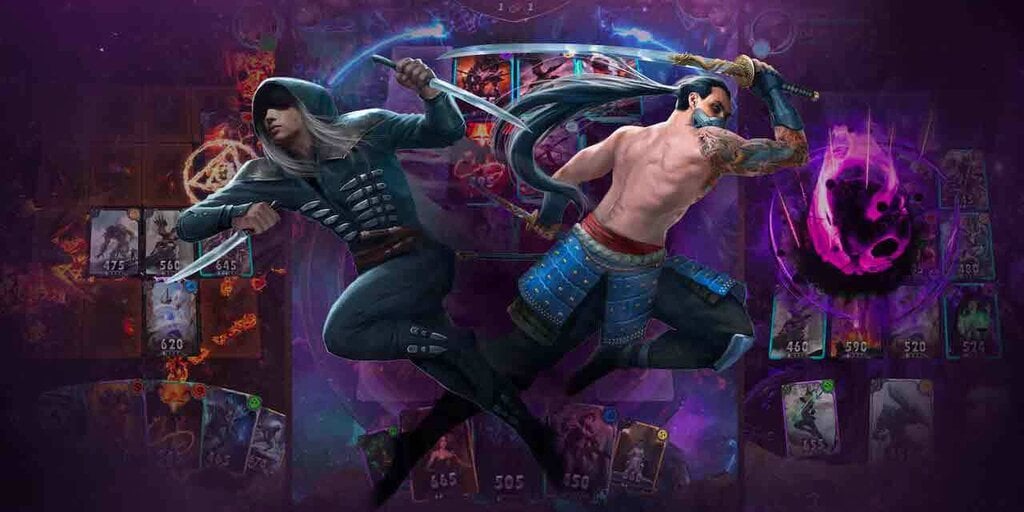This story comes from GG. Your Web3 Gaming Power-Up
Discover GG
Cross the Ages is a free-to-play, mobile-first collectible card game that is unlike any other you’ve played—and it lets you mint your favorite cards as NFTs. This is a hard game to pick up and equally as difficult to master, but the sharp learning curve creates room for intense wins once you slog through some early duels.
Two players battle it out with the goal to dominate as much of the board as possible by facing off with decks of cards. The goal is to finish the game with more points than your opponent.
You can mint your favorite cards onto Immutable X, an Ethereum scaling network, and sell the NFT on their secondary marketplace (Cross the Ages migrated from Polygon in 2022). Currently, it appears that there are no additional benefits to doing this other than flexing on your friends—or to make a few extra bucks.
Each card can be minted a limited number of times—from 5,000 to 800,000—so if you get your hands on a rare card, mint it while you can. The Web3 community can also earn in-game rewards through challenges and competitions promoted on the game’s Twitter account.
Watch our video review above for a closer look at the gameplay, and read on for more.
A complex clash
In Cross the Ages, each game is a 1v1 skirmish that sees players take turns to put a card onto the battlefield. The goal is to amass more points than your enemy by having control of cards, as well as creating trinities—I’ll explain this later.
Every card has a power value, and simply put, a card that has a higher power value than another will take control of that rival card. Each card is also assigned an element, and some elements are more or less powerful against others. How can you tell? Enter the helpful heptagram below.
Here, you can see which cards are more effective against which elements (with the green line) as well as which are less effective (the red line). It’s also very important to note the purple lines, as these are affinities that will boost the power of your cards on the board too.
If you control three cards whose elements’ are next to each other on the heptagram, you’ll create a trinity. This boosts your cards’ power, as well as gives you points. An example of a trinity at work is the pairing of air, nature, and earth. The game gets deeper than this with element-boosting cards, abilities, and more—but in the interest of time (and sanity), I’ll leave you with the basics.
All that said, the tutorial doesn’t hold your hand caringly at all. You are thrown into the deep end, quickly running through every aspect of the game. This proved very overwhelming for me, and I went into my first few games not really understanding what was going on—a big cause of frustration. Such a unique and complex game should walk players through the elements slowly to clearly break down how everything works.
Mobile-first, for better or worse
Cross the Ages is a “mobile-first” game that’s available on iOS and Android, making it easily accessible to potentially millions of players, but it does have a desktop version of the game that I tested. And as a complex, highly tactical, and competitive game, it’s fair to assume that a lot of the player base will opt for the PC version.
Unfortunately, this version of the game isn’t very well put together. For starters, the actual content of the game is restricted to a smartphone-sized portrait format with the sides of the screen being lazily filled… and sometimes even empty.
That said, when playing the game on the computer, you always have the heptagram in view—a huge life-saver. But within the cramped gameplay portion of the screen, I also found the battlefield to be a little crowded, and at first it’s hard to see which cards are in your control or not.
That said, each card has complex and interesting artwork that gives Cross the Ages a lot more character than if they’d opted for a more basic, easy-to-understand art style.
Tough, but rewarding
While my nitpicks and frustrations are many, Cross the Ages can be a rather fun game once you get past the nagging issues. You’re bound to get absolutely destroyed in your first few games, however. It’s a baptism of fire that every player must go through. But once you’re on the other side, the game can be tough to put down.
There’s something about the somewhat unhealthy relationship I built with the game that made my first few victories taste so sweet. When I first dominated someone, just like I had been dominated in the past, it tasted even sweeter.
By the time you’re good at the game, you’ll be ready for ranked mode where the sharp learning curve continues apace. There’s an enjoyable game here if you can make it past the lackluster tutorial and unoptimized desktop port, which may put off some users more than others.
Overall, though, I really respect that Cross the Ages takes such a unique approach to the collectible card genre. It’s both hard to pick up and hard to master—but pretty fun to try and overcome those hurdles.
